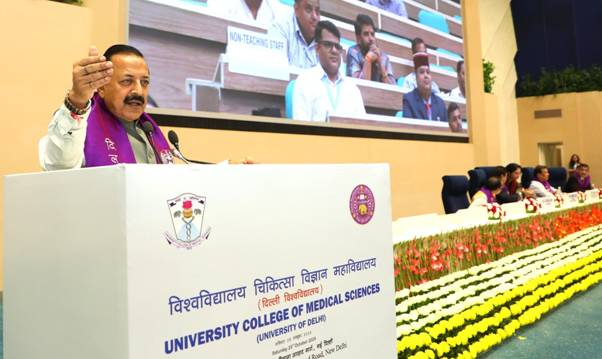Dr Jitendra Singh Highlights India’s Transformative Decade in Medical Education and Healthcare
Dr. Jitendra Singh conferred degrees upon undergraduate and postgraduate students and congratulated them for entering the profession at a time of great change.

- Country:
- India
Union Minister of State (Independent Charge) for Science & Technology, Dr. Jitendra Singh, underscored the unprecedented transformation India's healthcare and medical education sectors have undergone over the past decade. Addressing the 54th Foundation Day and College Convocation of the University College of Medical Sciences (UCMS), University of Delhi, the Minister described the ongoing decade as a turning point that has made India's healthcare more accessible, affordable, and inclusive, while firmly positioning the country as a global leader in biomedical innovation.
A Transformative Decade for Medical Education
Dr Jitendra Singh conferred degrees upon undergraduate and postgraduate students and congratulated them for entering the profession at a time of great change. He observed that India's medical education system has witnessed a "paradigm shift" with a rapid rise in the number of medical colleges, AIIMS institutions, and training opportunities.
He shared that a decade ago, India had only around 45,000 undergraduate medical seats, while today that number has grown to nearly 1.5 lakh, marking an almost threefold increase. The establishment of new AIIMS across the country has democratized access to quality medical education, enabling more students—especially women—from diverse regions to pursue medical careers.
"The expansion of medical institutions has not only created opportunities but also ensured that healthcare delivery reaches even the remotest corners of the country," Dr. Singh said. He highlighted that the government's focus on balanced regional development in health education has strengthened both rural and urban healthcare systems.
Accessible, Affordable, and Available Healthcare
The Minister outlined the three pillars of India's healthcare transformation—making it accessible, affordable, and available to all citizens. He credited flagship government schemes such as Ayushman Bharat, the world's largest health insurance program, and Jan Aushadhi Kendras, which provide low-cost generic medicines, for revolutionizing public health delivery.
"These initiatives have redefined the relationship between the citizen and the state," he said. Drawing from his own experiences as a medical professional, Dr. Singh highlighted the evolution of health insurance in India, particularly the inclusion of pre-existing diseases in coverage, which he termed "one of the most humane innovations in public health policy."
India's Growing Global Footprint in Biotechnology and Medical Research
Dr. Jitendra Singh emphasized that India's life sciences and biotechnology sectors have achieved global credibility through innovation and collaboration. He pointed out that India's Department of Biotechnology (DBT) developed the world's first DNA vaccine for COVID-19 and an indigenous HPV vaccine for cervical cancer prevention, both monumental achievements that placed India among the world's leading innovators in healthcare.
He further cited the development of 'Nafithromycin', India's first indigenous antibiotic, and successful gene therapy trials for haemophilia, published in the New England Journal of Medicine, as evidence of India's scientific prowess. "These breakthroughs demonstrate that India is emerging not just as a consumer of technology, but as a producer and exporter of high-impact healthcare solutions," he said.
Dr. Singh urged medical institutions such as UCMS to partner with the private sector and research organizations to conduct advanced clinical trials and translational research. "The era of working in silos is over. Collaboration across academia, industry, and government labs is the key to discovery and impact," he remarked.
The Role of Technology and AI in Future Healthcare
Addressing the evolving challenges in the medical field, Dr. Jitendra Singh noted that doctors today face a bi-phasic disease spectrum—with both communicable and non-communicable diseases coexisting alongside challenges like an ageing population and environmental health risks.
He highlighted the transformative potential of artificial intelligence (AI) in healthcare, citing his own experience of experimenting with AI-enabled tele-mobile clinics. "AI is not just a diagnostic tool—it can communicate in the patient's language, empathize through tone, and offer comfort while delivering precision," he explained. "It represents a hybrid model—technology empowered by human compassion."
Celebrating UCMS's Legacy and Achievements
On the occasion of UCMS's 54th Foundation Day, a Souvenir publication was released, chronicling the institution's journey since its establishment. The document showcased UCMS's contributions to medical research, public health initiatives, and academic excellence, including its partnership with Guru Teg Bahadur (GTB) Hospital in community health projects.
Dr. Singh also presented awards and medals to outstanding students and faculty members for their contributions to medical education and research. He praised UCMS for nurturing generations of healthcare professionals who have served both India and the global medical community with distinction.
Empowering the Next Generation of Doctors
In his closing remarks, Dr. Jitendra Singh reminded the graduates of their unique position in India's growth story. "Those receiving their degrees today will be at the prime of their careers when India celebrates 100 years of independence in 2047," he said. "You are the architects of a healthier, self-reliant, and globally respected India."
He encouraged them to embody the twin values of empathy and innovation, to stay curious, and to serve humanity with both scientific excellence and moral responsibility.
The event began with a welcome address by Prof. (Dr.) Mahesh Verma, Chairman of the Governing Body of UCMS, followed by remarks from Prof. Balaram Pani, Dean of Colleges, University of Delhi. Faculty members, students, and senior officials attended the convocation, which symbolized not just an academic milestone but also the integration of medical education with India's national mission for science, technology, and innovation-driven growth.
ALSO READ
-
J.P. Nadda Highlights India’s Expanding Medical Education and Healthcare Milestones at AIIMS 50th Convocation
-
India's Medical Education Boom: A Surge in Seats and Science
-
Dr Jitendra Singh Urges Private Sector-Led Innovation at TREAT-DM 2025
-
Temjen Imna Along Meets Dr Jitendra Singh to Boost Science, Innovation in Nagaland
-
Dr Jitendra Singh Calls for Regional Collaboration to Strengthen Bioinnovation Ecosystem





